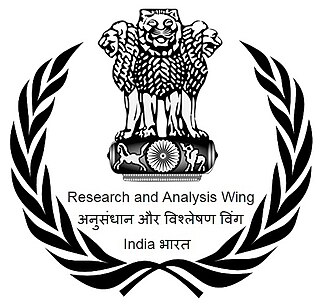
The Durrani Empire or the Afghan Empire, also known as the Sadozai Kingdom, was an Afghan empire that was founded by Ahmad Shah Durrani in 1747 and spanned parts of Central Asia, the Iranian plateau, and South Asia. At its largest territorial extent, it ruled over the present-day Afghanistan, Pakistan, parts of northeastern and southeastern Iran, eastern Turkmenistan, and northwestern India. Next to the Ottoman Empire, the Durrani Empire is considered to be among the most impactful Muslim empires of the latter half of the 18th century.

The Jammu & Kashmir National Conference (JKNC) is a regional political party in the Indian union territories of Jammu and Kashmir and Ladakh. Founded as the All Jammu and Kashmir Muslim Conference by Sheikh Abdullah and Chaudhry Ghulam Abbas in 1932 in the princely state of Jammu and Kashmir, the organisation renamed itself to "National Conference" in 1939 in order to represent all the people of the state. It supported the accession of the princely state to India in 1947. Prior to that, in 1941, a group led by Ghulam Abbas broke off from the National Conference and revived the old Muslim Conference. The revived Muslim Conference supported the accession of the princely state to Pakistan and led the movement for Azad Kashmir.

The Research and Analysis Wing is the foreign intelligence agency of India. The agency's primary function is gathering foreign intelligence, counter-terrorism, counter-proliferation, advising Indian policymakers, and advancing India's foreign strategic interests. It is also involved in the security of India's nuclear programme.
All Parties Hurriyat Conference (APHC) is an alliance of 26 political, social and religious organizations formed on 9 March 1993, as a united political front to raise the cause of Kashmiri separatism in the Kashmir conflict. Mehmood Ahmed Saghar was the first convener of the APHC-PAK chapter when the alliance was established in 1993. The alliance has historically been viewed positively by Pakistan as it contests the claim of the Indian government over the State of Jammu and Kashmir. Mirwaiz Umar Farooq is its chairman and in 2009 Mehmood Ahmed Saghar was unanimously elected as convener of APHC in Pakistan, and Ghulam Muhammad Safi was elected as its convener in Pakistan in January 2010.

Farooq Abdullah is an Indian politician and President of Jammu & Kashmir National Conference. He has served as the Chief Minister of Jammu and Kashmir on several occasions since 1982, and as the union minister for New and Renewable Energy between 2009 and 2014. He is the son of the 1st elected Chief Minister of Jammu and Kashmir Sheikh Abdullah, and father of former Chief Minister of Jammu and Kashmir Omar Abdullah.

Jaish-e-Mohammed is a Pakistan-based Deobandi Jihadist militant group active in Kashmir which is widely considered as a terrorist group. The group's primary motive is to separate Kashmir from India and merge it into Pakistan.

The concept of an Indo-Pakistani Confederation advocates for a political confederation consisting of the sovereign states of India and Pakistan as a means of ending bilateral conflicts and promoting common interests in defence, foreign affairs, and cultural and economic development. While this idea does not propose to end the sovereign existence of either nation through reunification, it is aimed to resolve the conflicts afflicting the Indian subcontinent since the partition of India in 1947.

The Durrani dynasty was founded in 1747 by Ahmad Shah Durrani at Kandahar, Afghanistan. He united the different Pashtun tribes and created the Durrani Empire with his Baloch tribes, which at its peak included the modern-day Afghanistan, Pakistan, as well as some parts of northeastern Iran, eastern Turkmenistan, and northwestern India including the Kashmir Valley.
Ved Prakash Marwah was an Indian police officer, who after retirement, served as governor of Manipur, Mizoram and Jharkhand. He died at Goa at the age of 87 after a three-week hospitalisation.

The History of Khyber Pakhtunkhwa refers to the history of the modern-day Pakistani province of Khyber Pakhtunkhwa, including the former Federally Administered Tribal Areas, which has colloquially been referred to as Pashtunistan. The earliest evidence from the region indicates that trade was common via the Khyber Pass; originating from the Indus Valley Civilization. The early people of the region were a Vedic people known as the Pakthas, identified with the modern day Pakhtun peoples. The Vedic culture reached its peak between the 6th and 1st centuries B.C under the Gandharan Civilization, and was identified as a center of Hindu and Buddhist learning and scholarship.
Lieutenant General Asad Ahmed Durrani is a retired 3-star rank general in the Pakistan Army and presently a commentator, speaker and author. Durrani previously served as the Director General of the ISI and former Director General of the Pakistan Army's Military Intelligence.

The Afghan–Sikh Wars spanned from 1748 to 1837 in Indian Subcontinent, and saw multiple phases of fighting between the Durrani Empire and the Sikh Empire. The conflict's origins stemmed from the days of the Dal Khalsa, and continued after the Emirate of Kabul succeeded the Durrani Empire.

Indian reunification refers to the potential reunification of India with Pakistan and Bangladesh, which were partitioned from British India in 1947.
The Maratha conquest of Northwest India occurred between 1757 and 1759, when the Maratha Empire captured the northwestern parts of the Indian subcontinent from the Durrani Empire. It had long-lasting effects upon the future geopolitics of the Indian subcontinent.
Ajit Bhattacharjea was a veteran Indian journalist, newspaper editor and campaigner for democratic rights, and the Right to Information Act. In a career spanning nearly 60 years, he remained the editor of the Hindustan Times, The Times of India and The Indian Express and after his retirement in 1983, was the director of the Press Institute of India till 2004.

A. S. Dulat is a former special director of the Indian Intelligence Bureau and former Secretary of Research and Analysis Wing from 1999 to 2000. After retirement he was appointed as advisor on Jammu and Kashmir in the Prime Minister's Office and served there from January 2000 to May 2004.
Bhola Nath Mullik was an Indian civil servant, spymaster and the second director of the Intelligence Bureau of India (IB). He served as the director of IB from July 15, 1950, to October 9, 1964. He was known to be a hardworking official, with close contacts with the then Union government. It was reported that Mullik had been a close associate of Jawaharlal Nehru, the erstwhile Indian prime minister and assisted Nehru to keep a watch on the movements of the relatives of Subhash Chandra Bose in the aftermath of Bose's disappearance in 1945. It was on his advice, that Nehru ordered for the establishment of Special Frontier Force (SFF) for defending against the Chinese army in the Sino-Indian War of 1962. The Government of India awarded him Padma Bhushan, the third-highest Indian civilian award, in 1964.

The Spy Chronicles: RAW, ISI and the Illusion of Peace is a 2018 book in the format of a dialogue between two intelligence chiefs of India and Pakistan, AS Dulat and Asad Durrani, and moderated by Aditya Sinha. The conversations between the two intelligence chiefs took place during 2016 and 2017 in Istanbul, Kathmandu and Bangkok. AS Dulat is a former head of India's external intelligence agency, the Research and Analysis Wing (R&AW), Lt. Gen. Asad Durrani is a former head of Pakistan's external agency, Inter-Services Intelligence (ISI), and Aditya Sinha is an Indian journalist.












